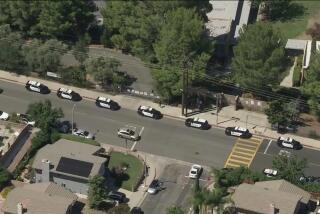NEA Offers Ideas to Reduce School Violence
- Share via
ORLANDO, Fla. — The largest U.S. teachers union focused Friday on counseling, smaller classes and discipline as ways to reduce school violence in the aftermath of the high school massacre in Littleton, Colo.
Gun-control measures that have dominated congressional debate drew only secondary attention among delegates and speakers at the annual meeting of the 2.4-million-member National Education Assn.
“Society has ceded too much control of discipline in our schools to the children,” said Rep. Patrick J. Kennedy (D-R.I.) before cheering delegates at the Orlando meeting. “Children must learn from kindergarten that the classroom is a place of restraint.”
Kennedy said teachers are the early warning system because they “probably have more face-to-face contact with children than these young people have with their parents on many days.”
“This does not mean you simply tape the Ten Commandments on the classroom wall,” he added, referring to the House of Representatives version of a youth-violence bill that did not close loopholes allowing unrestricted gun sales at gun shows but did allow states and school districts to post the biblical mandates in public schools.
NEA President Bob Chase said guns are just one element of the problem.
“I think it’s gotten the most attention because the divisions in Congress were so deep on that issue,” he said in an interview.
He said the shooting deaths at Columbine High School had brought to a head some other school issues, with greater consensus in Washington for smaller schools, smaller classes and more mental health workers.
“Whether this new consensus will result in greater resources is still an open question, but there has been greater consensus on the need since Columbine,” Chase said.
Beverly Coleman-Miller, a Harvard University expert on school violence, said she noticed a distinct change in the debate on school violence soon after the Columbine shooting in April, when two teenagers killed 12 classmates and a teacher before taking their own lives.
“Children who had been called savages and predators before were now being called misunderstood and depressed,” she said. “That change in tone has made it easier for mental health experts to talk about the problems of students who were simply being marginalized before,” she said. “After Columbine, everything is out in the open.”
John Heineman, a high school teacher from Lincoln, Neb., said teachers still have to fight for extracurricular funding for programs that help them identify students who may need psychological help.
“Classroom size is a real problem,” said Charlotte Welch, a teacher from Raleigh, N.C. “I think if we had smaller schools with a homier atmosphere we would have a lot less violence.”
More to Read
Sign up for Essential California
The most important California stories and recommendations in your inbox every morning.
You may occasionally receive promotional content from the Los Angeles Times.













